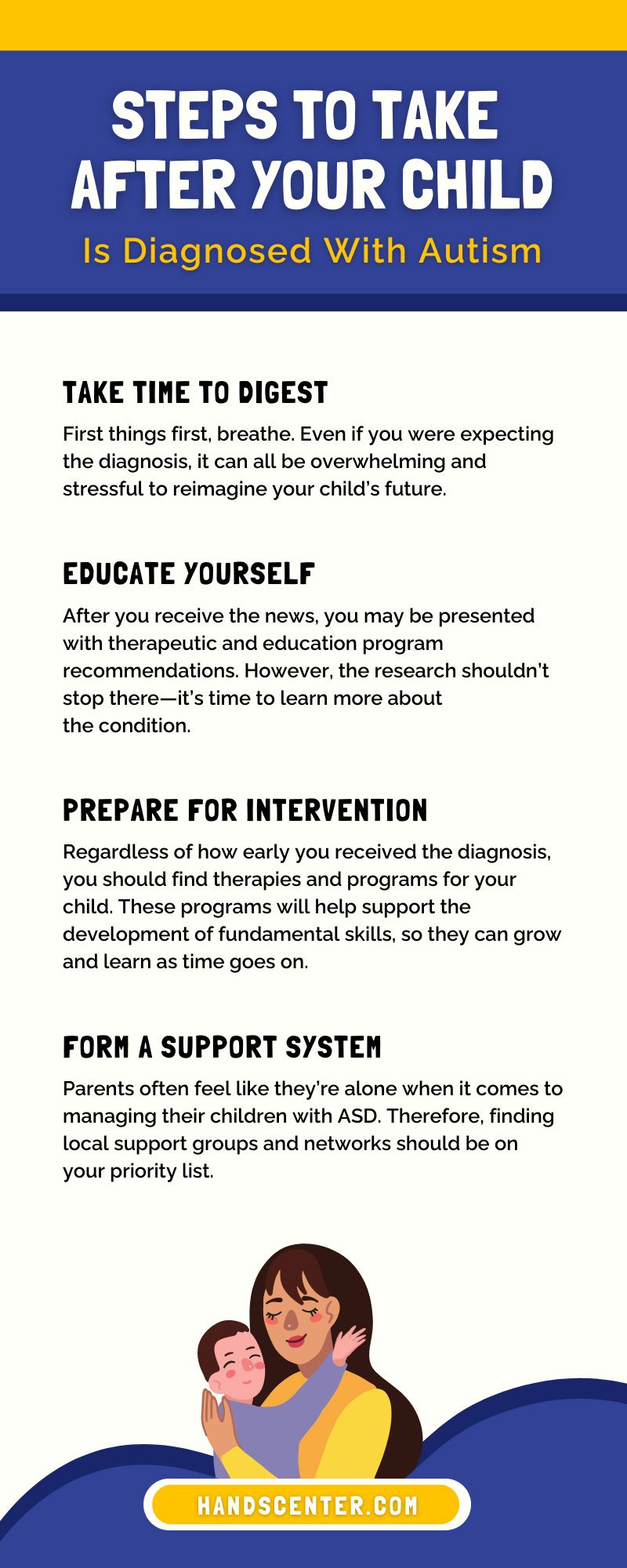Steps To Take After Your Child Is Diagnosed With Autism
So, you just got the news that your child has been diagnosed with Autism Spectrum Disorder (ASD). Although it may come as a shock to many parents, some parents may have been expecting it. Either way, most parents who receive the diagnosis have trouble finding successful ways to support their children. It’s important to know that you’re not alone in this journey, and there are multiple ways to give your child the support needed to succeed in their personal and academic goals.
However, it’s important to remember that there’s no cure for autism, but there is hope. Your child can develop fundamental skills, gain new skills, and grow with educational treatments, patience, and hard work. Here are the next steps to take after your child is diagnosed with autism to help make this journey a little easier.
Take Time To Digest
First things first, breathe. Even if you were expecting the diagnosis, it can all be overwhelming and stressful to reimagine your child’s future. It may be comforting to know that research for ASD has grown tremendously over the years. Professionals, colleges, and institutes around the country have developed effective programs to help children with autism develop and master skills that will help them live healthy and productive lives.
Educate Yourself
After you receive the news, you may be presented with therapeutic and education program recommendations. However, the research shouldn’t stop there—it’s time to learn more about the condition.
This involves reading multiple articles, forums, and online support group tips about the new normal of raising a child with autism. But don’t get yourself down a rabbit hole. Educating yourself could change how you and your child interact and impact your child’s behavior and socialization as they mirror your actions.
Prepare for Intervention
Many parents catch their child’s behavioral, emotional, and social cues early; sometimes, ASD can be detected at 18 months. However, most children don’t receive the final diagnosis until they’re much older. Regardless of how early you received the diagnosis, you should find therapies and programs for your child. These programs will help support the development of fundamental skills, so they can grow and learn as time goes on.
Early intervention is highly recommended, but it’s never too late to enroll your child. Some of these therapies include:
- Physical therapy
- Behavioral therapy
- Occupational therapy
- Speech therapy
Try To Understand Their Experience
When raising a child, it’s important to understand them, know their interests, and listen to their needs and aspirations. Some children with autism have a tougher time communicating these things, so it’s essential that you sit down and get to know their unique behaviors and communicative patterns.
You may have seen children with autism “stimming” or performing repetitive movements such as flapping their arms or twirling around. This is due to increased sensory needs, but it’s no different from repeatedly clicking a pen or tapping your foot.
However, you should monitor your child’s movements to see which one typically happens before a meltdown. Work with professionals to find other ways your child can soothe themselves without being disruptive or harming themselves.
Form a Support System
Parents often feel like they’re alone when it comes to managing their children with ASD. Therefore, finding local support groups and networks should be on your priority list. HANDS offers weekly Parent Training and Parent Support Group to help you form a strong support system. Attending our weekly training and support group will help you navigate your new normal with tips, recommendations, and helping hands. Talking with other parents and experts is a great way to learn new skills and possibly form friendships, so your child has another like-minded pal.
Explore Multiple Treatment Options
Seeking autism service providers is another vital step after your child is diagnosed with autism. Multiple treatment strategies for ASD have been proven to help children develop social, behavioral, and interpersonal skills that will help them cope with life’s challenges.
There’s no “one size fits all” therapy because not everyone with autism is the same, so it’s important to try different approaches to see which one is the most successful. However, the most performed treatment is ABA, in addition to other strategies tailored to your child.
Engage in Their Treatments
At HANDS Center for Autism, we encourage the parents, guardians, and additional family members to be a helping hand. Engaging in their treatments and participating in some activities could help the child feel more comfortable and eager to learn. You can model these same behaviors and strategies at home by working with your child and the expert.
How To Support Them at Home
Implementing the same skills you learned at the treatment center is a great way to support your child when at home. For example, children with autism tend to be visual learners, so implementing visuals into their daily routine could help. Having pictures and labels around the house will help your child understand common tasks much easier, decreasing the chances of stress or frustration.
Learning to listen with your eyes can also help make daily routines much smoother. Since some children with autism have a delay in speech development or are nonverbal, it may make verbal communication challenging—but that doesn’t mean they’re not communicating. Taking the lessons they’ve learned in speech therapy and understanding how your child communicates will make interacting much easier.
Monitor Your Child’s Progress
Parents and caregivers must continue to explore helpful approaches and implement these new skills to monitor the child’s progress. None of these therapies are one-and-done solutions. It would be best if you continued to educate your child to aid in them mastering fundamental life skills needed for a healthy life. Although the process is not easy, having a supportive group of family and friends is essential in ensuring your child is learning and growing every day.
The most important step you should take after receiving your child’s diagnosis is to take care of yourself. You can’t support anyone if you don’t support yourself. Carrying stress and anxiety can lead to health problems. To prevent this, remember to eat, sleep, exercise, and relax. Go out on a walk or watch a funny movie—do something healthy that can aid in stress management.
Our top-notch professionals at HANDS Center for Autism are happy to support you and your child. Our priority is to give your child the most fulfilling life possible by offering top treatments and programs for children with autism. Contact us today for more information.







